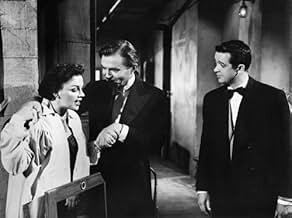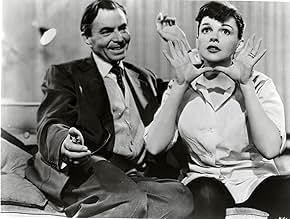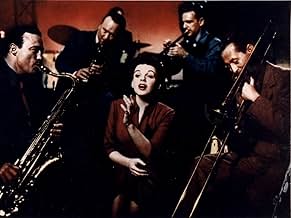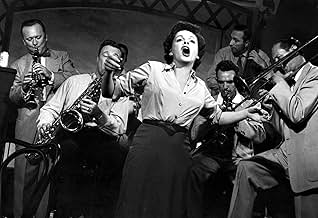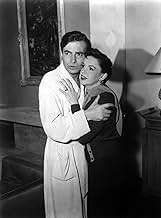IMDb RATING
7.5/10
21K
YOUR RATING
A fading matinee idol helps a young singer and actress find fame, even as age and alcoholism send his own career on a downward spiral.A fading matinee idol helps a young singer and actress find fame, even as age and alcoholism send his own career on a downward spiral.A fading matinee idol helps a young singer and actress find fame, even as age and alcoholism send his own career on a downward spiral.
- Nominated for 6 Oscars
- 7 wins & 14 nominations total
Tommy Noonan
- Danny McGuire
- (as Tom Noonan)
John Alban
- Academy Awards Attendee
- (uncredited)
Laurindo Almeida
- Guitarist
- (uncredited)
Leon Alton
- Usher
- (uncredited)
Rudolph Anders
- Mr. Ettinger
- (uncredited)
David Armstrong
- Soundman
- (uncredited)
Phil Arnold
- Agent #3
- (uncredited)
Nadine Ashdown
- Esther - Age 6
- (uncredited)
Gertrude Astor
- Racetrack Spectator
- (uncredited)
Featured reviews
This is a great film. Yes it is long. Yes some of the songs should have been cut but they weren't but we get a masterpiece anyway.
In this film Esther Blodgett is a talented aspiring singer with a band, and Norman Maine is a former matinee idol with a career in the early stages of decline. When he arrives intoxicated at a function at the Shrine Auditorium, the studio publicist attempts to keep him away from reporters. After an angry exchange, Norman rushes away and bursts onto a stage where an orchestra is performing. Esther takes him by the hand and pretends he is part of the act, thereby turning a potentially embarrassing and disruptive moment into an opportunity for the audience to greet Norman with applause.
Norman then takes Esther under his wing and gets her a screen test at the studio in which he works. She ends up homecoming a major star and his drinking escalates!
After the film was released Warner Brothers recalled the prints. 30 minutes were edited out. In 1983 Ron Haver was able to restore most of the film. Where he could not find footage for the missing scenes he used productions stills. People claim this halts the picture. It doesn't! Besides it only last a total of 7 minutes. It is not 7 minutes all at once!
Now in 2010 it was reported that film restorer Michael Arick had a print of this film. He will not let Warner Brothers use the print. Some people claim that he doesn't have a print however "He has never publicly denied it".
It is also Rumored that Tommy from Beverly Hills has hours of the films outtakes on VHS however it is silent footage. Maybe it might include the missing 7 minutes.
In this film Esther Blodgett is a talented aspiring singer with a band, and Norman Maine is a former matinee idol with a career in the early stages of decline. When he arrives intoxicated at a function at the Shrine Auditorium, the studio publicist attempts to keep him away from reporters. After an angry exchange, Norman rushes away and bursts onto a stage where an orchestra is performing. Esther takes him by the hand and pretends he is part of the act, thereby turning a potentially embarrassing and disruptive moment into an opportunity for the audience to greet Norman with applause.
Norman then takes Esther under his wing and gets her a screen test at the studio in which he works. She ends up homecoming a major star and his drinking escalates!
After the film was released Warner Brothers recalled the prints. 30 minutes were edited out. In 1983 Ron Haver was able to restore most of the film. Where he could not find footage for the missing scenes he used productions stills. People claim this halts the picture. It doesn't! Besides it only last a total of 7 minutes. It is not 7 minutes all at once!
Now in 2010 it was reported that film restorer Michael Arick had a print of this film. He will not let Warner Brothers use the print. Some people claim that he doesn't have a print however "He has never publicly denied it".
It is also Rumored that Tommy from Beverly Hills has hours of the films outtakes on VHS however it is silent footage. Maybe it might include the missing 7 minutes.
On a brief getaway this past weekend, the hotel where I was staying had TCM (Turner Classic Movies) on its cable roster and, lo! and behold, there was Judy singing and acting her heart out in letterbox and stereo sound. TCM...you're the best!
It was the restored version, thank the good Lord, with that sad reminder of Warner Brothers' pathetic timidity in trashing Cukor's original cut, but recalling for us his masterful use of the widescreen ratio. (A "formatted" version would be simply unwatchable, what with numerous scenes played by actors perched on the outer reaches of the screen, opposite each other.)
James Mason turns in an absolutely brilliant performance, especially when one recalls the rigors of production, with filming going months over schedule, due to Judy's unhappy vicissitudes (so evident in her appearance even within the same scene!) With the very able support of Charles Bickford, as the most benign studio head ever, and Jack Carson proving why Warners kept him employed so often for so many years.
Plus musical direction taking fabulous advantage of Warners' studio orchestra (and WB's sound technicians who were, for several decades running, the envy of all the other major studios), and arrangements that must have overwhelmed first-run audiences with their incredible richness.
It's a must-see, all right, and is in a class by itself, among the several screen versions of this beloved Hollywood saga.
It was the restored version, thank the good Lord, with that sad reminder of Warner Brothers' pathetic timidity in trashing Cukor's original cut, but recalling for us his masterful use of the widescreen ratio. (A "formatted" version would be simply unwatchable, what with numerous scenes played by actors perched on the outer reaches of the screen, opposite each other.)
James Mason turns in an absolutely brilliant performance, especially when one recalls the rigors of production, with filming going months over schedule, due to Judy's unhappy vicissitudes (so evident in her appearance even within the same scene!) With the very able support of Charles Bickford, as the most benign studio head ever, and Jack Carson proving why Warners kept him employed so often for so many years.
Plus musical direction taking fabulous advantage of Warners' studio orchestra (and WB's sound technicians who were, for several decades running, the envy of all the other major studios), and arrangements that must have overwhelmed first-run audiences with their incredible richness.
It's a must-see, all right, and is in a class by itself, among the several screen versions of this beloved Hollywood saga.
Marked by a pervasive sense of melancholy, the 1954 musical version of the familiar Hollywood warhorse will forever be remembered as Judy Garland's most acclaimed work in films. Even though she would go on to a handful of films in the early 1960's, this was her last leading role in a major Hollywood production, an ironic point since she plays an emerging movie star on the rise. True, she doesn't look her best in the film, but her fulsome talent is on full, heart-wrenching display as Esther Blodgett, an obscure but thriving band singer who becomes movie star Vicki Lester thanks to Norman Maine, an alcoholic has-been movie star in career free-fall. Their love story and the opposing trajectories of their careers are tracked meticulously by Moss Hart's shrewdly observed screenplay and George Cukor's sensitive direction.
The double-sided 2000 DVD provides the 176-minute restored version, which is just five minutes less than what was shown at the original premiere. Until 1983, the half-hour of footage excised after the premiere was thought lost, but film historian Ron Haver found much of it and supervised an extraordinary restoration effort that includes a necessary albeit brief use of production stills to match up with the complete soundtrack. Even with such technicalities, the resulting film is even more of a landmark musical drama, emotionally resonant in spite of certain pacing issues with the storyline. Cukor's approach is probably more leisurely than the relatively hard-boiled material requires since he includes so many establishing and lengthy shots, but his direction shows his legendary sensitivity toward actors.
While he comes across a bit too robust as a fading matinée idol, James Mason vigorously captures Norman's scornful pride and self-pity. He may lack Fredric March's innate sense of vulnerability in the original, but Mason makes the character's inner torment more palpable. As for Garland, she brings so much of her own history to Esther/Vicki that her scenes feel alive with her vibrant, masochistic personality. She is aided immeasurably by the masterful songs of Harold Arlen and Ira Gershwin, most significantly her torchy rendition of "The Man That Got Away", as perfect a musical movie moment as has been ever produced. While her work in the fifteen-minute "Born in the Trunk" sequence is impressive, it is really later in the film when she soars, in particular, when she segues from the tap-happy "Lose That Long Face" into a breakdown scene in her dressing room with sympathetic studio head Oliver Niles portrayed with his typically stentorian fervor by Charles Bickford.
The print condition and sound quality on the DVD are superb. There are also some fascinating extras on the B-side starting with three alternative takes on "The Man That Got Away", each distinctive in presentation with costume and lighting changes, a must for Garland fans. Also included is a very brief deleted number within the "Born in the Trunk" sequence", "When My Sugar Walks Down the Street". Three vintage pieces have been gathered - a brief newsreel piece of the premiere, a four-minute clip of the Coconut Grove premiere party held after the premiere, and most interestingly, a half-hour kinescope akin to the current-day red carpet pre-shows with an amazing parade of period stars expressing little more than good wishes on their way to the theater. Lastly, the theatrical trailers for all three versions of "A Star Is Born" are also included.
The double-sided 2000 DVD provides the 176-minute restored version, which is just five minutes less than what was shown at the original premiere. Until 1983, the half-hour of footage excised after the premiere was thought lost, but film historian Ron Haver found much of it and supervised an extraordinary restoration effort that includes a necessary albeit brief use of production stills to match up with the complete soundtrack. Even with such technicalities, the resulting film is even more of a landmark musical drama, emotionally resonant in spite of certain pacing issues with the storyline. Cukor's approach is probably more leisurely than the relatively hard-boiled material requires since he includes so many establishing and lengthy shots, but his direction shows his legendary sensitivity toward actors.
While he comes across a bit too robust as a fading matinée idol, James Mason vigorously captures Norman's scornful pride and self-pity. He may lack Fredric March's innate sense of vulnerability in the original, but Mason makes the character's inner torment more palpable. As for Garland, she brings so much of her own history to Esther/Vicki that her scenes feel alive with her vibrant, masochistic personality. She is aided immeasurably by the masterful songs of Harold Arlen and Ira Gershwin, most significantly her torchy rendition of "The Man That Got Away", as perfect a musical movie moment as has been ever produced. While her work in the fifteen-minute "Born in the Trunk" sequence is impressive, it is really later in the film when she soars, in particular, when she segues from the tap-happy "Lose That Long Face" into a breakdown scene in her dressing room with sympathetic studio head Oliver Niles portrayed with his typically stentorian fervor by Charles Bickford.
The print condition and sound quality on the DVD are superb. There are also some fascinating extras on the B-side starting with three alternative takes on "The Man That Got Away", each distinctive in presentation with costume and lighting changes, a must for Garland fans. Also included is a very brief deleted number within the "Born in the Trunk" sequence", "When My Sugar Walks Down the Street". Three vintage pieces have been gathered - a brief newsreel piece of the premiere, a four-minute clip of the Coconut Grove premiere party held after the premiere, and most interestingly, a half-hour kinescope akin to the current-day red carpet pre-shows with an amazing parade of period stars expressing little more than good wishes on their way to the theater. Lastly, the theatrical trailers for all three versions of "A Star Is Born" are also included.
This movie is not without its flaws, but overall, it is a masterpiece.
The quintessential story of a couple, one who's career is on the rise, the other on the decline- is made extraordinary by the performances.
Ester Blodgett, aka: Vicki Lester (Judy Garland) plays the unknown talent with pipes that would put an organ to shame. Her singing in this movie is definitely a HUGE reason to watch it- especially the show stopper, "The Man that got away." Ester meets, by chance & some help from the bottle, the cinematic icon, Norman Maine (James Mason.) Even though he's drunk, he is taken with her. Much later that night, he finds her at a club just "kickin' it" with the boys in the band. In what is probably the best 5 mins of music in the history of musicals- Judy lets it all out in "The Man that got away." Sincerely, I MYSELF, have never heard singing like that. So absolutely raw, almost uncontrolled and full-out and all heart that it always gives me goosebumps! And an unobserved Norman Maine comes out of the shadows to tell Ester that he TOO has never heard singing like that. He tells her, (completely sober after sleeping off a little) that she has a great talent. And he makes her believe it.
She eventually gets her chance with some help from Norman, and makes a big hit movie. She starts to make a lotta hit movies. Meanwhile, Norman gets cut from the studio by his longtime friend & boss, Oliver Niles. One thing leads to another & even though he is happily married now to Ester, his drinking starts up again. In a scene that is almost too awful to watch, he stumbles in on her acceptance speech at the Academy Awards. I dunno if that slap was real, but it looked real. And the ashamed look on his face afterwards looks real.
I won't give away the ending, but I will tell you why I liked this movie. First of all is Judy's singing. There are many memorable songs and moments. She always gives it her all when she sings. Or to paraphrase Ester in the movie, it's when she is her most alive. Her acting is terrific too. In a scene that is so well written and ahead of its time (and timeless), Ester tells her friend & studio head that she is worried about what's happening to her & Norman. That she hates him for the lies, for the promises to quit, and for failing. That she too feels like a failure. This scene encapsulates the ripple effect caused by alcoholism. Judy is absolutely mesmerizing as the wife who has discovered that love is not enough.
James Mason delivers one of the best & most convincing performances of an alcoholic on the decline that I've ever seen on screen. First of all, his charm & sincerity are apparent. When Libby (his Publicity Agent) says that his appeal & charm escape him, it's because he didn't see this side of him. He only saw the mean drunk and that wasn't who Norman Maine really was. James Mason is LOOKS so convincing that you'd swear he had a quick 6 or 7 drinks before the shoot. And his pain is real. In the scene where she gets him out of night court, his self-disgust and shame are vividly on his face. And the scene where he over-hears Ester & Oliver talking about him is enough to make anyone reach for the hankies. He has so much chemistry with Judy that you'd swear they were really in love. Many a reviewer has mentioned this- and I won't speculate on it- suffice to say that it adds tremendously to the movie, because it seems palpable how much Ester & Norman care about each other & are desperately in love. Definite Oscar-calibre performance by Garland & Mason here. This is the story of the Oscar that got away. In any world that was just, they both would've gotten one.
All the supporting roles are well done and not too obtrusive. My only complaint with the movie is the editing. I'm happy to have the restored version, but the editing could've made a more intense, compact version of the film. I will give one of many examples: The scene towards the end where her friend from the band arrives at her house to take her to the benefit. It is a very important scene. The next scene is at the benefit location. We have several minutes of them showing the backstage bustle before Ester & her friend enter. They already showed in the beginning of the film all the backstage confusion- it slows down the story. They could've cut directly to the part where she & him walk in. You still get a sense of what's going on around them without that long lead-in. That is just an example, there are more. But it is a minor complaint - I have a DVD & can scan when I need to. Overall this is a timeless movie with outstanding performances. A must see!!
The quintessential story of a couple, one who's career is on the rise, the other on the decline- is made extraordinary by the performances.
Ester Blodgett, aka: Vicki Lester (Judy Garland) plays the unknown talent with pipes that would put an organ to shame. Her singing in this movie is definitely a HUGE reason to watch it- especially the show stopper, "The Man that got away." Ester meets, by chance & some help from the bottle, the cinematic icon, Norman Maine (James Mason.) Even though he's drunk, he is taken with her. Much later that night, he finds her at a club just "kickin' it" with the boys in the band. In what is probably the best 5 mins of music in the history of musicals- Judy lets it all out in "The Man that got away." Sincerely, I MYSELF, have never heard singing like that. So absolutely raw, almost uncontrolled and full-out and all heart that it always gives me goosebumps! And an unobserved Norman Maine comes out of the shadows to tell Ester that he TOO has never heard singing like that. He tells her, (completely sober after sleeping off a little) that she has a great talent. And he makes her believe it.
She eventually gets her chance with some help from Norman, and makes a big hit movie. She starts to make a lotta hit movies. Meanwhile, Norman gets cut from the studio by his longtime friend & boss, Oliver Niles. One thing leads to another & even though he is happily married now to Ester, his drinking starts up again. In a scene that is almost too awful to watch, he stumbles in on her acceptance speech at the Academy Awards. I dunno if that slap was real, but it looked real. And the ashamed look on his face afterwards looks real.
I won't give away the ending, but I will tell you why I liked this movie. First of all is Judy's singing. There are many memorable songs and moments. She always gives it her all when she sings. Or to paraphrase Ester in the movie, it's when she is her most alive. Her acting is terrific too. In a scene that is so well written and ahead of its time (and timeless), Ester tells her friend & studio head that she is worried about what's happening to her & Norman. That she hates him for the lies, for the promises to quit, and for failing. That she too feels like a failure. This scene encapsulates the ripple effect caused by alcoholism. Judy is absolutely mesmerizing as the wife who has discovered that love is not enough.
James Mason delivers one of the best & most convincing performances of an alcoholic on the decline that I've ever seen on screen. First of all, his charm & sincerity are apparent. When Libby (his Publicity Agent) says that his appeal & charm escape him, it's because he didn't see this side of him. He only saw the mean drunk and that wasn't who Norman Maine really was. James Mason is LOOKS so convincing that you'd swear he had a quick 6 or 7 drinks before the shoot. And his pain is real. In the scene where she gets him out of night court, his self-disgust and shame are vividly on his face. And the scene where he over-hears Ester & Oliver talking about him is enough to make anyone reach for the hankies. He has so much chemistry with Judy that you'd swear they were really in love. Many a reviewer has mentioned this- and I won't speculate on it- suffice to say that it adds tremendously to the movie, because it seems palpable how much Ester & Norman care about each other & are desperately in love. Definite Oscar-calibre performance by Garland & Mason here. This is the story of the Oscar that got away. In any world that was just, they both would've gotten one.
All the supporting roles are well done and not too obtrusive. My only complaint with the movie is the editing. I'm happy to have the restored version, but the editing could've made a more intense, compact version of the film. I will give one of many examples: The scene towards the end where her friend from the band arrives at her house to take her to the benefit. It is a very important scene. The next scene is at the benefit location. We have several minutes of them showing the backstage bustle before Ester & her friend enter. They already showed in the beginning of the film all the backstage confusion- it slows down the story. They could've cut directly to the part where she & him walk in. You still get a sense of what's going on around them without that long lead-in. That is just an example, there are more. But it is a minor complaint - I have a DVD & can scan when I need to. Overall this is a timeless movie with outstanding performances. A must see!!
Much has been written about this movie (to extremely great length) in other reviews, so I'll try to keep this fairly brief and concise.
First, the restored version runs at 176 minutes. The movie originally ran at 181 minutes, but was cut to 154 minutes when theater owners complained that they were losing money due to the excessive length. The cut destroyed the integrity of the movie - director Cukor never saw the movie again. However, the restored version contains stills to replace some of the cut footage, and gives a better sense of the film's power and scope.
Second, all four major studio versions of the story (including "What Price Hollywood?") have their own merits and differ greatly from one another. If you like the story, see them all and compare for yourself. It's quite fun to compare!
Third, definitely see this version for Judy. Sure, Judy's "The Man That Got Away" may be the greatest musical moment on cinema, but it's her dramatic performance that will keep your attention over almost three hours. James Mason is on target, and the supporting cast is fine, but Judy just dominates the screen. It's an opportunity to see a true genius in action at the absolute height of her powers. For more dramatic Judy, see her in "The Clock".
George Cukor was acclaimed as the great director of actresses, and he raises Judy to the height she deserves. I love Judy. This is a 10 out of 10.
First, the restored version runs at 176 minutes. The movie originally ran at 181 minutes, but was cut to 154 minutes when theater owners complained that they were losing money due to the excessive length. The cut destroyed the integrity of the movie - director Cukor never saw the movie again. However, the restored version contains stills to replace some of the cut footage, and gives a better sense of the film's power and scope.
Second, all four major studio versions of the story (including "What Price Hollywood?") have their own merits and differ greatly from one another. If you like the story, see them all and compare for yourself. It's quite fun to compare!
Third, definitely see this version for Judy. Sure, Judy's "The Man That Got Away" may be the greatest musical moment on cinema, but it's her dramatic performance that will keep your attention over almost three hours. James Mason is on target, and the supporting cast is fine, but Judy just dominates the screen. It's an opportunity to see a true genius in action at the absolute height of her powers. For more dramatic Judy, see her in "The Clock".
George Cukor was acclaimed as the great director of actresses, and he raises Judy to the height she deserves. I love Judy. This is a 10 out of 10.
Did you know
- TriviaGeorge Cukor offered Marlon Brando the role of Norman Maine on the set of Jules César (1953). "Why would you come to me?" asked Brando. "I'm in the prime of my life... If you're looking around for some actor to play an alcoholic has-been, he's sitting right over there"- pointing at his costar James Mason, who got the part.
- GoofsAfter Vicki comes home and she performs in her house for Norman, the doorbell rings and he goes to the door to accept a package for Vicki. His hair is all mussed-up when he goes to the door, but after he closes it and the camera goes back to him, there isn't a hair out of place. Then he walks over to where Vicki is and his hair is all mussed-up again.
- Quotes
[last lines]
Vicki Lester: Hello, everybody. This is Mrs. Norman Maine.
- Alternate versionsContrary to popular belief, the film was not originally at 181 minutes, but rather 196 (3hrs. and 16mins.) at a post-premiere shown on August 8, 1954 in Huntington Park, California. After its second post-premiere - the very next day - two scenes of 15 minutes total were deleted; making the film run its original world debut length at 181 minutes. One was a number called "When My Sugar Walks Down the Street" that came after Judy's take of "I'll Get By" in the 'Born in the Trunk' sequence, the other was a scene where Garland and James Mason's characters (Vicki and Norman) were picnicking on the beach; production stills and promotional advertisements are the only thing left in existence of the footage. After its world premiere on September 29, 1954, 27 minutes was cut, bringing it down to a mediocre 154 time length. Those scenes were:
- 1) Esther quitting the band
- 2) The Trinidad Coconut Oil Shampoo
- 3) Esther working at a drive-in
- 4) Norman being driven away drunk in his car
- 5) Norman inquiring Esther's old landlady
- 6) Spotting Esther on the TV commercial
- 7) Tracking down Esther at her new boarding residence
- 8) Driving down the strip - Esther getting sick
- 9) "Here's What I'm Here For" musical number - Norman proposes
- 10) "Lose That Long Face" musical number - Vicki breaks down
- ConnectionsFeatured in Film Night: Special: Forty Years in Hollywood (1970)
- SoundtracksGotta Have Me Go with You
(uncredited)
Music by Harold Arlen
Lyrics by Ira Gershwin
Performed by Judy Garland with Jack Harmon & Don McKay
Details
Box office
- Budget
- $5,019,770 (estimated)
- Gross US & Canada
- $4,335,968
- Gross worldwide
- $4,350,001
- Runtime
- 2h 34m(154 min)
- Aspect ratio
- 2.55 : 1
Contribute to this page
Suggest an edit or add missing content








